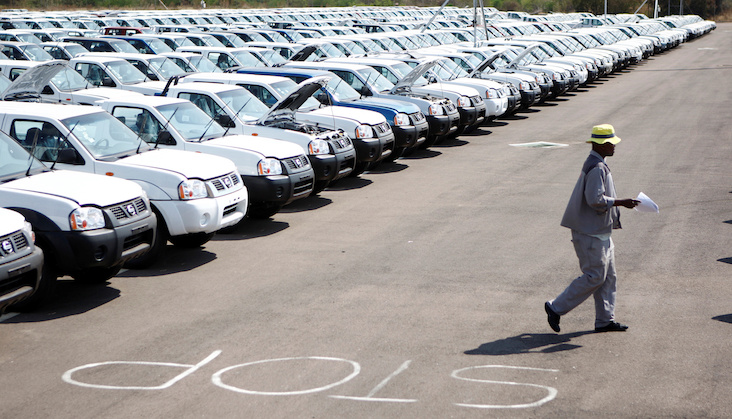South African officials have the next eight days to work out the finer details of the Southern African Customs Union deal with the UK.
What’s going on?
Brexit is focusing minds across the southern tip of the continent, including those within the Southern African Customs Union (SACU).
- South Africa’s trade and industry minister, Rob Davies, and his SACU counterparts from Lesotho, Namibia, Eswatini and Botswana, as well as non-SACU Mozambique, have been in talks on a post-Brexit trade agreement with the UK.
- They failed to reach an agreement last week with the UK’s minister of state for trade policy, George Hollingbery, in Botswana.
- The date fixed for Brexit is 29 March, although UK prime minister Theresa May has asked for an extension.
Davies says the major issue is at stake is “cumulation” => this allows countries to process imported materials and them label them as their own. The rules of origin exist to ensure the benefit of preferential access goes to the countries that are party to a free trade agreement.
Because South Africa is in a trade deal called an Economic Partnership Agreement (EPA) with the EU, and because the UK will leave the EPA when it leaves the European Union, problems have emerged.
- “The EPA does not provide for cumulation on the basis being advanced by the UK, namely full cumulation with EU material, especially when the EU material is subjected to a higher duty when exported to SACU and Mozambique than when the material is exported from the UK. SACU and Mozambique are unable to give any better treatment to the UK than the EU,” Davies told The Africa Report.
In terms of trade with the UK, a new agreement will replace the existing EPA when the country leaves the EU.
The numbers:
The UK is South Africa’s biggest trading partner within the EU, with total trade between the two countries in 2017 amounting to R70.6bn, excluding gold. 18% of South Africa’s exports to the EU go to the UK and 10% of its imports come from the UK. The UK is South Africa’s its eighth-largest trading partner globally.
The UK has published a schedule of tariffs that would apply if it left the EU without an agreement. Some items – such as fruit and vegetables – would be duty-free. But among the 469 tariff lines attracting duty would be products that South Africa exports, and the UK would in some cases be charging more than the EU.
The big one for South Africa is the auto sector, which
- currently produces around 600 000 new vehicles annually,
- provides employment for around 112 000 people,
- contributes an estimated 7.7% of the country’s gross domestic product (GDP).
Davies outlined three scenarios for SACU countries and Mozambique, depending on UK prime minister Theresa May’s ability to get Brexit through parliament:
- Withdrawal agreement: If May gets Brexit through, on 29 March Britain leaves the EU but all trade arrangements with third parties and trade deals stay in place until the end of 2020.
- Extension granted by EU: That gives time to continue to negotiate the particular bilateral agreement so that it goes through parliament, by the end of June in South Africa’s case. This would allow South Africa to roll over the EPA that SACU has with the EU, a preferred solution.
- No deal Brexit: The worst-case scenario for SACU, as tariffs would be put in place. “It will mean difficulties for the automotive sector especially,” says Davies, as well as meat and fish exports. Fresh fruit and vegetables would be relatively unaffected.
Bottom line:
Given that the UK has asked for an extension, the worst will most likely be avoided. But for the rest of the continent questions still remain.
- “We do have at least in place the Free Trade Agreement into the EU. But the rest of the continent does not. And I have not seen anything from the UK yet as for whether they will offer any preference to Least Development Countries or the rest of the continent or anything like that, so I do not know. There is a lot of uncertainty on that,” Davies told The Africa Report.
Understand Africa’s tomorrow… today
We believe that Africa is poorly represented, and badly under-estimated. Beyond the vast opportunity manifest in African markets, we highlight people who make a difference; leaders turning the tide, youth driving change, and an indefatigable business community. That is what we believe will change the continent, and that is what we report on. With hard-hitting investigations, innovative analysis and deep dives into countries and sectors, The Africa Report delivers the insight you need.
View subscription options

